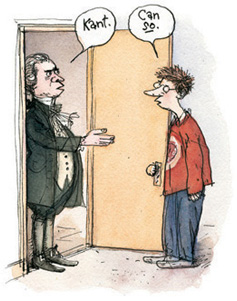 Wittgenstein's view of intention (not necessarily moral intention) = diametrically opposed to Kant's picture of the will, understanding and maxim. For the former the result (action) is that matters; for the latter, it is the will (intention) that matters.
Wittgenstein's view of intention (not necessarily moral intention) = diametrically opposed to Kant's picture of the will, understanding and maxim. For the former the result (action) is that matters; for the latter, it is the will (intention) that matters.I thought that the Kantian view hinged upon one's knowing (it being knowable) his own will perfectly: I.e., a god's-eye view of the soul. Very internal. Does this make sense?
Or to keep it in Kantian terms, you can never know your self in itself (given in the CPR, you can only know an appearance of your self); the examples given in the Groundwork for the Metaphysics of Morals are crafted to isolate the will, so that one can know his will perfectly. But this seems to be a merely empirical, psychological testing of the will. Kant grants that you can't know your self in itself. At best you're left with a representation of a representation.
But I still lack even a clue as to what Wittgenstinian ethics would look like.
I started reading last night before bed Rorty's Philosophy and the Mirror of Nature. It's the most exciting book of philosophy I've read in such a long time! (A probably effect of its being the most current one I've read in some time.)
 Dread and fear should not be confused;
Dread and fear should not be confused;By dread I'm inspired, fear I'm amused.
